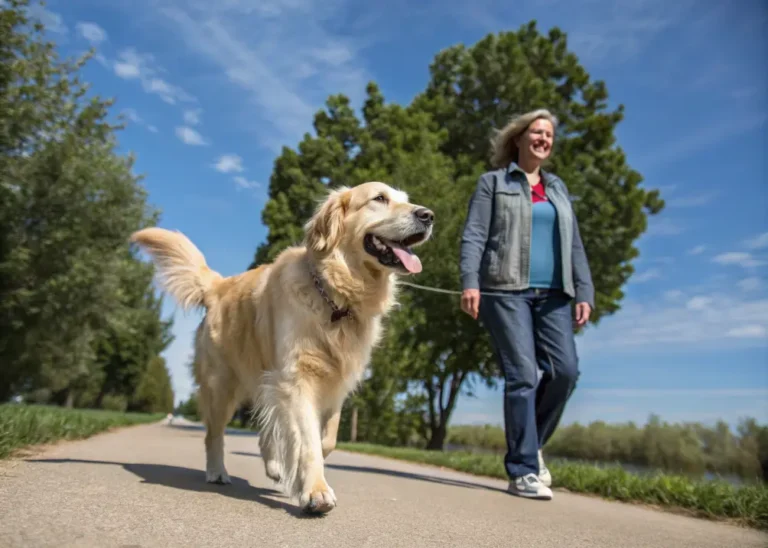The Ultimate Guide to Golden Retrievers: History, Traits, Stats, and FAQs
Golden Retrievers are one of the most cherished dog breeds globally, celebrated for their intelligence, gentle temperament, and iconic golden coats. This comprehensive guide covers their origins, traits, statistics, and answers to frequently asked questions, providing everything you need to know about this beloved breed. Whether you’re considering adoption or simply curious, let’s explore the world of Golden Retrievers from the smallest details to the broader picture.

Origin and History
The Beginnings in Scotland
The Golden Retriever breed was developed in the late 19th century at the Guisachan estate in the Scottish Highlands by Dudley Marjoribanks, later known as Lord Tweedmouth. His aim was to create a versatile hunting dog that excelled at retrieving game, particularly waterfowl, while maintaining a friendly and trainable nature.
- Key Milestone: In 1868, Lord Tweedmouth bred a yellow Wavy-Coated Retriever named Nous with a Tweed Water Spaniel named Belle, laying the foundation for the Golden Retriever breed.
- Further Development: Over the following decades, selective breeding with breeds like the Irish Setter, Bloodhound, and other retrievers refined the breed’s retrieving ability and distinctive coat.
- Official Recognition: The Kennel Club (UK) recognized the breed as the “Yellow or Golden Retriever” in 1911, and the American Kennel Club (AKC) followed in 1932. The name “Golden Retriever” became standard due to the breed’s golden-hued coat.
Spread and Popularity
Golden Retrievers gained popularity in the early 20th century, particularly in the UK and North America, for their versatility as hunting dogs and their friendly demeanor. By the late 20th century, they became cultural icons, appearing in films like Air Bud and serving as service dogs.
- Stat: The AKC reports that Golden Retrievers have consistently ranked among the top five most popular dog breeds in the U.S. since the 1990s, holding the #3 spot in 2024 registrations.

Physical Characteristics
Golden Retrievers are medium-to-large dogs with a balanced, athletic build suited for work and play. Here are their key physical traits:
- Size:
- Males: 23–24 inches (58–61 cm) tall at the shoulder; weight 65–75 pounds (29–34 kg).
- Females: 21.5–22.5 inches (55–57 cm) tall; weight 55–65 pounds (25–29 kg).
- Coat: Dense, water-repellent double coat with a thick undercoat and a longer, wavy or straight outer coat. Colors range from light cream to rich golden, with occasional reddish hues in some lines.
- Build: Muscular yet graceful, with a broad head, expressive eyes, and a strong, level topline.
- Lifespan: 10–12 years on average, though some live up to 15 years with proper care.
Variations
- Field vs. Show Lines: Field-bred Golden Retrievers, bred for hunting, are leaner and more athletic, often with darker coats. Show-bred Goldens are stockier, with thicker, lighter-colored coats.
- Stat: A 2018 study by the Golden Retriever Club of America noted that field-bred Goldens are 10–15% lighter on average than show-bred ones.

Temperament and Behavior
Golden Retrievers are renowned for their exceptional temperament, making them ideal for families and service roles. Their key behavioral traits include:
- Friendly and Sociable: Goldens are naturally outgoing, rarely showing aggression, and get along well with children, strangers, and other pets.
- Intelligent: Ranked as the 4th most intelligent dog breed by canine psychologist Stanley Coren in The Intelligence of Dogs (1994), they excel in obedience and problem-solving.
- Eager to Please: Their desire to please makes them highly trainable, often mastering complex commands quickly.
- Playful and Energetic: Goldens require regular physical and mental stimulation, thriving in active households.
Behavioral Stats
- Trainability: A 2020 survey by the American Pet Products Association found that 92% of Golden Retriever owners rated their dogs as “very easy” or “easy” to train.
- Sociability: A 2019 study in Applied Animal Behaviour Science noted that Golden Retrievers scored among the highest for positive interactions with unfamiliar dogs and people.

Roles and Versatility
Golden Retrievers are incredibly versatile, excelling in roles beyond family pets:
- Hunting Dogs: Their original purpose, they retrieve game with precision and have a “soft mouth” to avoid damaging birds.
- Service and Therapy Dogs: Their intelligence and gentle nature make them ideal for assisting people with disabilities or providing emotional support in hospitals and schools.
- Stat: The Guide Dogs for the Blind organization reported in 2023 that Golden Retrievers make up 30% of their guide dog program.
- Search and Rescue: Their keen sense of smell and stamina make them valuable in disaster response, such as after the 9/11 attacks.
- Competitive Sports: They excel in agility, obedience, and dock diving due to their athleticism and trainability.

Health and Care
While generally healthy, Golden Retrievers are prone to specific health issues. Regular veterinary care and a healthy lifestyle are essential.
Common Health Issues
- Hip and Elbow Dysplasia: Structural joint issues that can lead to arthritis. A 2017 study by the Orthopedic Foundation for Animals found that 19.6% of Golden Retrievers screened had hip dysplasia.
- Cancer: Goldens have a higher-than-average risk of cancers like hemangiosarcoma and lymphoma. A 2015 study by the Morris Animal Foundation estimated that 60% of Golden Retrievers may develop cancer in their lifetime.
- Heart Conditions: Subaortic stenosis, a heart defect, affects some Goldens. Regular cardiac screenings are recommended.
- Eye Disorders: Conditions like cataracts and progressive retinal atrophy have a 10% prevalence in the breed, per the Canine Eye Registration Foundation (2022).
Care Requirements
- Exercise: Goldens need 1–2 hours of daily exercise, such as walking, running, or swimming. Fetch is ideal due to their retrieving instincts.
- Grooming: Their double coat requires brushing 2–3 times a week to prevent matting and reduce shedding, with daily brushing during shedding seasons.
- Diet: A balanced diet tailored to their age, size, and activity level is crucial. Obesity is a concern, with 62% of U.S. Golden Retrievers classified as overweight in a 2021 Purina study.
- Training: Early socialization and obedience training are vital to channel their energy and intelligence. Positive reinforcement works best.

Grooming and Maintenance
Golden Retrievers have moderate grooming needs due to their dense coats:
- Brushing: Use a slicker brush or undercoat rake 2–3 times weekly to remove loose fur and prevent tangles. Daily brushing is ideal during shedding seasons.
- Bathing: Every 6–8 weeks or as needed, using dog-specific shampoo to maintain coat health.
- Nail Trimming: Monthly trimming prevents overgrowth and discomfort.
- Ear Cleaning: Weekly checks and cleaning reduce the risk of ear infections, common due to floppy ears.
- Dental Care: Brush teeth 2–3 times a week to prevent plaque buildup, as dental disease affects 80% of dogs over age 3, per the American Veterinary Dental College (2020).

Fun Facts and Stats
- Pop Culture: Golden Retrievers have starred in films like Homeward Bound (1993) and Air Bud (1997), boosting their popularity.
- Record Holder: In 2006, a Golden Retriever named Augie set a Guinness World Record for holding five tennis balls in his mouth at once.
- Global Popularity: The breed ranks in the top 10 in countries like Australia, Canada, and the UK, per 2023 kennel club data.
- Social Media Presence: As of 2025, the hashtag #GoldenRetriever has over 12 million posts on Instagram, reflecting their widespread appeal.

Challenges of Owning a Golden Retriever
While Golden Retrievers are wonderful companions, they come with challenges:
- High Energy: Without sufficient exercise, they may become bored or destructive.
- Shedding: Their heavy shedding can be overwhelming for those with allergies or a preference for a tidy home.
- Health Costs: Their predisposition to cancer and joint issues can lead to significant veterinary expenses.
- Space Needs: They thrive in homes with yards or access to open spaces, less suited for small apartments.

Frequently Asked Questions (FAQs)
1. Are Golden Retrievers good for first-time dog owners?
Yes, their friendly nature and trainability make them suitable for first-time owners, provided owners can meet their exercise and grooming needs. Early training and socialization are key to managing their energy.
2. How much exercise does a Golden Retriever need?
Golden Retrievers require 1–2 hours of daily exercise, including activities like walking, running, swimming, or playing fetch. Mental stimulation, such as puzzle toys, is also beneficial.
3. Do Golden Retrievers shed a lot?
Yes, they shed moderately year-round and heavily during spring and fall. Regular brushing (2–3 times weekly, daily during shedding seasons) helps manage loose fur.
4. Are Golden Retrievers hypoallergenic?
No, Golden Retrievers are not hypoallergenic due to their heavy shedding and dander production. They may not be ideal for those with severe allergies.
5. What is the difference between field-bred and show-bred Golden Retrievers?
Field-bred Goldens are leaner, more athletic, and often darker in color, bred for hunting. Show-bred Goldens are stockier, with thicker, lighter coats, bred for conformation to breed standards.
6. How long do Golden Retrievers live?
Their average lifespan is 10–12 years, though some live up to 15 years with proper care, diet, and regular veterinary checkups.
7. Are Golden Retrievers prone to specific health issues?
Yes, they are susceptible to hip and elbow dysplasia (19.6% prevalence), cancer (60% lifetime risk), heart conditions, and eye disorders (10% prevalence), per studies from 2015–2022.
8. Can Golden Retrievers live in apartments?
They can adapt to apartments if given sufficient exercise and mental stimulation, but they thrive in homes with yards or access to open spaces.
9. How do I find a reputable Golden Retriever breeder?
Look for breeders registered with organizations like the AKC or the Golden Retriever Club of America, who conduct health screenings and prioritize temperament and breed standards. Avoid puppy mills.
10. Are Golden Retrievers good with children and other pets?
Yes, their gentle and sociable nature makes them excellent with children and other animals, especially when socialized early. Supervision is recommended with young children.

References
- Coren, S. (1994). The Intelligence of Dogs. Free Press.
- American Kennel Club (2024). Most Popular Dog Breeds.
- Morris Animal Foundation (2015). Golden Retriever Lifetime Study.
- Orthopedic Foundation for Animals (2017). Hip Dysplasia Statistics.
- Canine Eye Registration Foundation (2022). Eye Disease Prevalence in Golden Retrievers.
- American Pet Products Association (2020). Pet Owner Survey.
- Purina (2021). Canine Obesity Study.
- Guide Dogs for the Blind (2023). Annual Report.
- Applied Animal Behaviour Science (2019). Dog Sociability Study.
Conclusion
Golden Retrievers are a remarkable blend of beauty, intelligence, and loyalty. From their origins as skilled hunting dogs to their modern roles as family pets, service dogs, and cultural icons, they continue to capture hearts worldwide. With proper care, training, and love, a Golden Retriever can be a devoted companion for over a decade. Whether you’re drawn to their playful energy or their unwavering devotion, this breed truly lives up to its golden reputation.
Considering a Golden Retriever? Be prepared for an active, affectionate, and rewarding journey. Have more questions or need guidance on adoption? Let me know!
Can’t get enough of Golden Retrievers? Don’t miss our other detailed and dog-loving posts!
35+ Golden Retriever FAQs Every Owner Should Read!
Puppy Training Guide for Golden Retrievers: Step-by-Step Tips
Golden Retriever Aggression: Causes, Prevention, and Facts (2025)
Do Golden Retrievers Bark a Lot? Understanding Their Barking Habits
How to Keep Your Golden Retriever Active and Healthy | Expert Wellness Tips
Golden Retriever Shedding Season: How Much They Shed & Tips for 2025
Why Golden Retrievers Are America’s Favorite Dog Breed in 2025






